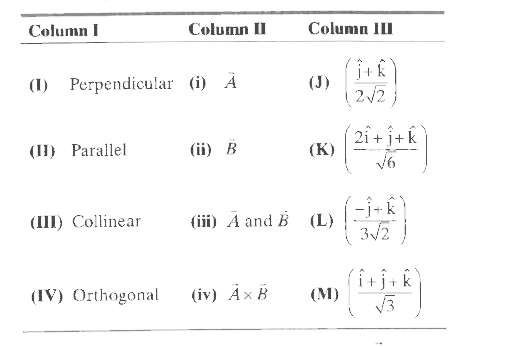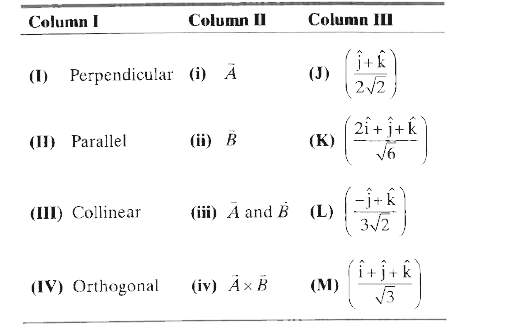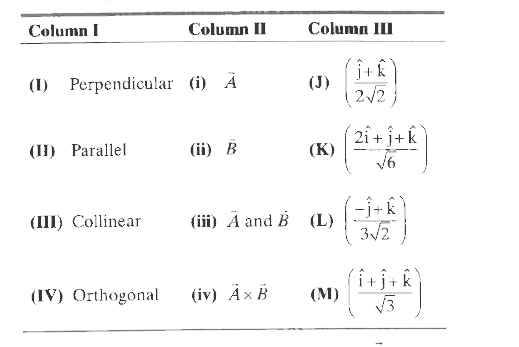If →A=2ˆi+ˆj+ˆkand→B=ˆi+ˆj+ˆk are the two vectors, match the following answer the questions by appropriately matching the information given in the three columns of the following table:

The correct alternative for a collinear vector to →A is
(III)(iv)(L)
(II)(ii)(K)
(IV)(i)(J)
(I)(iii)(M)
The correct Answer is:B
Step by step video, text & image solution for If vecA = 2 hati + hatj + hatk and vecB = hati + hatj + hatk are the two vectors, match the following answer the questions by appropriately matching the information given in the three columns of the following table: The correct alternative for a collinear vector to vecA is by Physics experts to help you in doubts & scoring excellent marks in Class 12 exams.
Topper's Solved these Questions
- BOOK - RESNICK AND HALLIDAYCHAPTER - VECTORS EXERCISE - PROBLEMS34videos
VECTORS
- BOOK - RESNICK AND HALLIDAYCHAPTER - UNITS AND MEASUREMENT EXERCISE - PRACTICE QUESTIONS (MATRIX-MATCH)11videos
UNITS AND MEASUREMENT
- BOOK - RESNICK AND HALLIDAYCHAPTER - WAVE - IIEXERCISE - PRACTICE QUESTIONS (INTEGER TYPE)5videos
WAVE - II
Similar Questions
Knowledge Check
- Question 1 - Select One
If →A=2ˆi+ˆj+ˆkand→B=ˆi+ˆj+ˆk are the two vectors, match the following answer the questions by appropriately matching the information given in the three columns of the following table:

Which vector represents the direction of →A×→B?A(II)(iv)(K)B(I)(ii)(J)C(IV)(i)(M)D(I)(iv)(L) - Question 2 - Select One
If →A=2ˆi+ˆj+ˆkand→B=ˆi+ˆj+ˆk are the two vectors, match the following answer the questions by appropriately matching the information given in the three columns of the following table:

Which option represents a vector orthogonal to →A×→B ?A(IV)(ii)(M)B(II)(ii)(J)C(I)(i)(L)D(III)(iv)(K) - Question 3 - Select One or More
If →A=2ˆi+ˆj+ˆkand→B=ˆi+ˆj+ˆk are two vectores, then the unit vector is
Aperpendicular to →Ais(−ˆj+ˆk√2).Bparallel to →Ais(2ˆi+ˆj+ˆk√6).Cperpendicular to →Ais(−ˆj+ˆk√2).Dparallel to →Ais(ˆi+ˆj+ˆk√3).
Given →a=ˆi−ˆj+ˆk and →b=2ˆi−4ˆj−3ˆk, find the magnitude of →a
View SolutionIf →a=(−ˆi+ˆj−ˆk) and →b=(2ˆi−2ˆj+2ˆk) then find the unit vector in the direction of (→a+→b).
View SolutionIf →A=2ˆi+ˆj+ˆkand→B=ˆi+ˆj+ˆk are two vectores, then the unit vector is
View SolutionGiven : →A=2ˆi−ˆj+2ˆk and →B=−ˆi−ˆj+ˆk. The unit vector of →A−→B is
View SolutionIf →A=3ˆi+ˆj+2ˆk and →B=2ˆi−2ˆj+4ˆk, then value of ∣∣→A+→B∣∣ will be
View Solution

